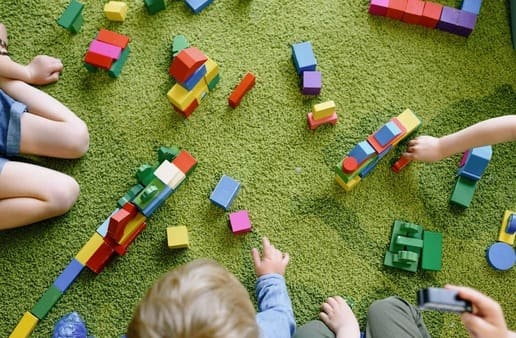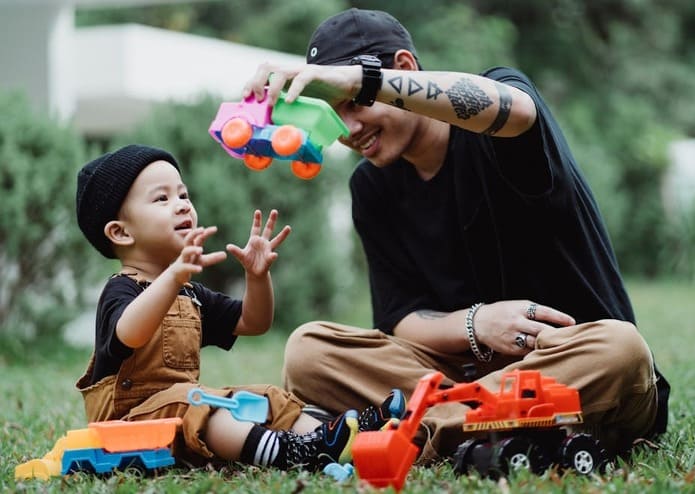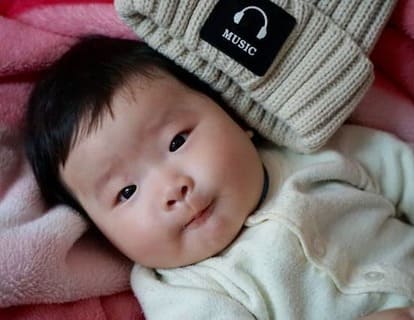The Amazing First Five Years: How Your Child's Brain Develops
Did you know that by age five, your child’s brain will have grown to 90% of its adult size, building the foundation for every experience, skill, and memory to come?. During this time, their brain grows at a pace never seen again, laying the foundation for learning, relationships, and lifelong well-being. As a parent, you have a unique opportunity to shape this growth through everyday moments of love, conversation, and play.
Let us unlock and discover the science behind early brain development, what to expect at each stage, and simple, practical ways to support your child’s amazing journey.
The Science Behind the Speed: Why These Years Matter So Much
From birth, your baby’s brain operates like a construction site working around the clock. Unlike other organs that grow gradually, the brain experiences explosive development, with neural pathways forming at a pace that will never be matched again in their lifetime.
Your newborn arrives with approximately 100 billion neurons nearly all they’ll ever have. What happens next is extraordinary: these neurons begin connecting with each other through synapses, creating the intricate wiring that will power every thought, emotion, and skill your child develops. During peak periods, synapses form at rates of up to 1 million per second, creating a three-year-old’s brain that actually contains more connections than an adult’s.
This isn’t random growth it’s your child’s brain preparing for life by building massive capacity for learning. Think of it as nature’s way of ensuring children can adapt to whatever environment and culture they’re born into, whether that’s a bustling city, a quiet farm, or anywhere in between.

Your child’s Brain Development Journey: What to Expect When
0-12 Months: The Foundation Years
During their first year, your baby’s brain focuses on survival and basic connection. Their sensory systems come online rapidly they’re born ready to recognize your voice, prefer faces over other patterns, and seek out human interaction. This is when the foundation for all future learning gets built.
Key developments include:
- Sensory processing systems rapidly maturing, allowing babies to make sense of sights, sounds, and touch
- Social smiling emerging around 2 months, signaling the development of social awareness
- Language foundation building as babies become “sound detectives,” distinguishing between different phonemes
- Motor skills developing as the brain learns to control the body through reaching, rolling, and eventually crawling
- Attachment relationships forming, which create the template for all future relationships and stress management
1-2 Years: The Exploration Explosion
Toddlerhood brings mobility and the beginning of independence. Your child’s brain is now sophisticated enough to support walking, basic communication, and the understanding that they are separate from you a cognitive leap that can be both exciting and challenging.
Major milestones include:
- First words appearing as the brain successfully links sounds to meanings
- Object permanence developing, showing improved memory and understanding of the world
- Imitation skills emerging, demonstrating the brain’s ability to learn through observation
- Emotional regulation beginning to develop, though tantrums are normal as the brain learns to manage big feelings
2-3 Years: The Language Revolution
This period often amazes parents as children seem to absorb language like sponges. The brain’s language centers are in overdrive, making connections between words, meanings, and concepts at an unprecedented rate.
Dramatic changes include:
- Vocabulary explosions, with some children learning new words daily
- Pretend play emerging, showing the brain’s growing ability to think symbolically
- Emotional awareness increasing, though self-control is still developing
- Social skills beginning to emerge through parallel play and interaction with peers
3-5 Years: Complex Thinking Takes Flight
The preschool years showcase the brain’s growing sophistication. Children can now engage in complex conversations, solve problems, and understand abstract concepts like rules and fairness.
Advanced developments include:
- Conversational skills flourishing, with endless “why” questions showing active learning
- Cooperative play with peers, demonstrating advanced social and emotional intelligence
- Problem-solving abilities emerging through puzzles, games, and daily challenges
- Self-awareness and empathy developing as children begin to understand others’ perspectives
The Brain’s Remarkable Pruning Process
One of the most fascinating aspects of early brain development is synaptic pruning the brain’s way of becoming more efficient. During the first few years, the brain creates far more connections than it needs, like a gardener planting extra seeds. Then, through a process scientists call “use it or lose it,” the brain strengthens frequently used pathways while eliminating others.
This pruning process is guided by your child’s experiences. Connections that get regular use through loving interaction, conversation, and play become permanent highways in the brain. Those that don’t get used gradually fade away. This is why rich, responsive experiences during these years have such lasting impact they literally shape which neural pathways your child’s brain will keep.
Critical Periods: Windows of Extraordinary Opportunity
Certain skills are best developed within specific time windows when the brain is most receptive to particular types of learning. Missing these windows doesn’t mean a child can’t develop these skills later, but it may be more challenging.
Language development shows the most dramatic critical period effects. Babies are born able to distinguish sounds from all human languages, but by 7-12 months, their brains begin specializing in the language(s) they hear most. This is why children who grow up bilingual from birth often speak both languages without accents, while adults learning a second language may always sound foreign.
Vision development also has critical periods. The brain’s visual processing centers need proper input during early years to develop normally. This is why early detection and treatment of vision problems is so crucial.
Social and emotional development flourishes when children receive responsive, nurturing care during these early years. The brain circuits responsible for managing emotions, forming relationships, and handling stress are particularly moldable during this period.
How Early Experiences Shape Brain Architecture
Every interaction with your child is quite literally building their brain. When you respond to their cries, engage in back-and-forth conversation, or provide comfort during distress, you’re not just being a loving parent you’re an architect of their neural development.
Positive experiences create strong, healthy neural pathways that support learning, emotional regulation, and resilience. Conversely, chronic stress, neglect, or trauma can disrupt healthy brain development, potentially affecting learning, behavior, and mental health throughout life.
The good news is that loving, responsive care acts as a powerful buffer against stress and provides the foundation for healthy development. Your warm interactions, consistent routines, and emotional availability create what scientists call a “secure base” from which your child can safely explore and learn.
Brain-Building Activities for Every Age
Supporting your child’s brain development doesn’t require expensive toys or structured programs. The most powerful brain-building tools are your voice, attention, and love.
For Babies (0-12 months):
Engage in frequent talking and singing throughout daily activities. Describe what you’re doing during diaper changes, feeding, and bathing. Respond to your baby’s coos and babbles this back-and-forth serves as their first conversation lessons. Provide plenty of skin-to-skin contact and gentle touch, which supports both emotional security and brain development. Play simple games like peek-a-boo that help develop memory and attention.
For Toddlers (1-2 years):
Read together daily, choosing books with simple pictures and repetitive text. Allow safe exploration of their environment with supervision toddlers learn through movement and manipulation of objects. Begin labeling emotions to help them develop emotional awareness. Encourage imitation games and simple pretend play, which build cognitive flexibility.
For Preschoolers (2-3 years):
Expand pretend play by providing props and joining in their imaginative games. Ask open-ended questions that encourage thinking: “What do you think will happen next?” Establish consistent routines that help their brains organize and predict daily events. Encourage storytelling and let them “read” to you, even if they’re making up the story.
For Older Preschoolers (3-5 years):
Facilitate social interactions through playdates and group activities. Encourage problem-solving by letting them help with age-appropriate household tasks. Support their natural curiosity with hands-on experiments and exploration. Provide opportunities for creative expression through art, music, and dramatic play.
The Power of Reading, Talking, Singing, and Playing
These four activities represent the foundation of brain building because they engage multiple systems simultaneously and provide the rich, interactive experiences young brains crave.
Reading builds vocabulary, comprehension, and imagination while providing intimate bonding time. The rhythm and rhyme of children’s books support language development, while pictures help children connect words to concepts.
Talking throughout the day provides constant language input and teaches the give-and-take of conversation. Narrating your activities, asking questions, and listening to responses all contribute to language development and cognitive growth.
Singing combines language learning with rhythm and melody, engaging multiple brain areas simultaneously. Songs help children remember information, develop phonological awareness, and experience the joy of shared musical experience.
Playing provides hands-on learning opportunities that engage creativity, problem-solving, and social skills. Through play, children practice real-world skills in a safe, fun environment while building the neural pathways that support learning.
Screen Time: Why Real Life Wins
In our digital age, it’s tempting to use screens as educational tools for young children. However, research consistently shows that real-world interactions provide richer learning experiences than screens during these crucial early years.
For children under 18 months, the American Academy of Pediatrics recommends avoiding screens except for video chatting with family members. From 18-24 months, high-quality programming watched together with parents can provide some benefit, but should be limited. For children 2-5 years, limiting screen time to one hour of high-quality programming per day allows plenty of time for the hands-on exploration and social interaction their brains need most.
The key difference is interactivity. Screens are passive experiences that don’t provide the back-and-forth engagement that builds neural pathways. Real-world play, conversation, and exploration engage multiple senses and provide immediate feedback that helps children understand cause and effect.
Read about Babies and Screen Time: The Need for Human Interaction
The Supporting Cast: Nutrition, Sleep, and Stress Management
While interaction and play capture most of the attention in discussions of brain development, three other factors play crucial supporting roles.
Nutrition provides the building blocks for brain growth. During these years of rapid development, children need adequate protein for neurotransmitter production, healthy fats for brain cell membranes, and various vitamins and minerals for optimal function. Iron is particularly important for cognitive development, while omega-3 fatty acids support brain structure and function.
Sleep is when the brain consolidates memories and clears out cellular waste. Babies need 14-17 hours of sleep daily, toddlers need 11-14 hours, and preschoolers need 10-13 hours. Adequate sleep supports memory formation, emotional regulation, and overall brain health.
Stress management is crucial because chronic stress can interfere with healthy brain development. While some stress is normal and even beneficial, toxic stress prolonged, severe stress without adequate support can disrupt neural development. Responsive caregiving, predictable routines, and emotional support help children develop healthy stress response systems.
Permission to Be Imperfect: Every Moment Counts, But Perfection Isn’t Required
Reading about brain development can feel overwhelming, especially when you understand how much impact these early years have on your child’s future. It’s important to remember that children’s brains are remarkably resilient, and perfect parenting isn’t required for healthy development.
What matters most is the overall pattern of care you provide. Missing a day of reading won’t damage your child’s brain development. Losing your patience occasionally won’t derail their emotional growth. Children thrive on love, attention, and reasonable consistency not perfection.
Trust your instincts as a parent while staying informed about your child’s development. Your loving care, combined with an understanding of how young brains grow, provides the best foundation for your child’s future success and happiness.
Your Role as Your child’s First Brain Architect
The first five years represent a unique window of opportunity when your child’s brain is most receptive to the experiences you provide. Every conversation, every book you read together, every song you sing, and every moment of comfort you offer is contributing to the neural architecture that will support your child throughout their life.
You don’t need special training or expensive materials to be an effective brain builder. Your love, attention, and responsiveness are the most powerful tools available. By understanding how your child’s brain develops and providing rich, nurturing experiences during these crucial years, you’re giving them the best possible foundation for learning, relationships, and future success.
The investment you make in these early years will pay dividends throughout your child’s life. Embrace the wonder of watching your child’s mind unfold, trust in your ability to nurture their growth, and remember that in the beautiful chaos of daily life with a young child, you’re participating in one of nature’s most remarkable processes the building of a human brain.
Read more about Sensory Activities: Boost Cognitive Development In Infants
Take Action Today: Start with one small change: have a conversation with your child during your next daily routine, read an extra book before bed, or simply put away your phone during playtime to give them your full attention. Your child’s developing brain will thank you for every moment of connection you provide.

Conclusion: Every Moment of Connection Counts
Supporting your child’s brain development doesn’t require perfection just small, intentional moments of connection each day. The early years are a unique window of opportunity, and your everyday actions make a lasting difference.
Simple ways to nurture your child’s growing brain:
- Have a conversation with your child during daily routines talk, listen, and respond
- Read an extra book together before bed
- Sing songs, play simple games, or tell stories
- Put away your phone during playtime and give your child your full attention
- Offer comfort and encouragement when your child needs it
Remember: Your child’s developing brain is shaped by every loving interaction you provide. Each moment of connection helps build a strong foundation for lifelong learning, resilience, and happiness.





